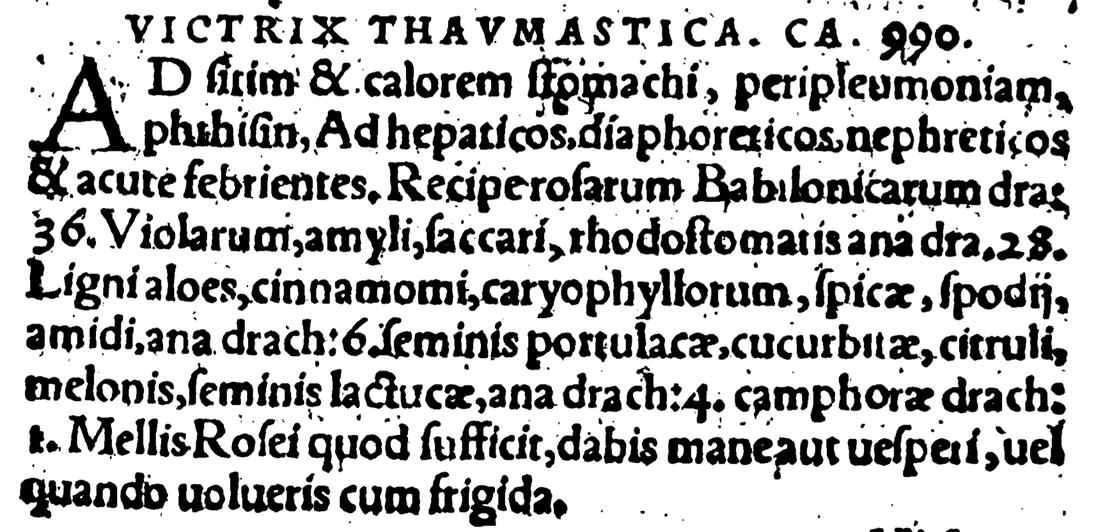Victrix Thaumastica
Marvellous Conquerer
or Electuary to Conquer
Western
Nicholas Alexandri (Medici Graeci, 1541)
* The texts lists Rosarum babilonicarum, Babylonian Rose
** The source text lists Spodium, which most often intends Tabasheer; in any case, Tabasheer is a better option in this formula.
*** The text lists Amyli (in the first instance where we have listed Starch), and Amidi (in the second instance). Both terms generally refer to Starch. Amidin is the modern name of starch which has been heated to become a horn-like substance. It is not known if perhaps this is the meaning in the text. If recreated, Starch could be used.
Powder the herbs, mix with the Rose water, then add the Sugar and Starch little by little, and with sufficient Honey of Roses form an Electuary.
Clears Heat, Benefits Yin
1. Heat and dryness of the Stomach
2. Pneumonia
3. Consumption
4. Liver disease from Heat and Yin deficiency
5. Heat and Yin deficiency of the Kidneys
6. Acute and Burning Fever
as much as a Walnut in the morning or evening
None noted
 Nicolai Alexandrini, Medici Graeci 1541
Nicolai Alexandrini, Medici Graeci 1541
 Back To ELECTUARIES
Back To ELECTUARIES
Back to FORMULAS
How to Modify a Formula
Substitutes
Weights & Measures
Marvellous Conquerer
or Electuary to Conquer
Tradition:
Western
Source / Author:
Nicholas Alexandri (Medici Graeci, 1541)
Herb NameRose *Violet Starch Sugar Rose water Aloeswood Cinnamon Clove Indian Spikenard Tabasheer ** Starch *** Purslane seed Gourd seed Pumpkin seed Melon seed Lettuce seed Camphor |
|
* The texts lists Rosarum babilonicarum, Babylonian Rose
** The source text lists Spodium, which most often intends Tabasheer; in any case, Tabasheer is a better option in this formula.
*** The text lists Amyli (in the first instance where we have listed Starch), and Amidi (in the second instance). Both terms generally refer to Starch. Amidin is the modern name of starch which has been heated to become a horn-like substance. It is not known if perhaps this is the meaning in the text. If recreated, Starch could be used.
Preparation:
Powder the herbs, mix with the Rose water, then add the Sugar and Starch little by little, and with sufficient Honey of Roses form an Electuary.
Function:
Clears Heat, Benefits Yin
Use:
1. Heat and dryness of the Stomach
2. Pneumonia
3. Consumption
4. Liver disease from Heat and Yin deficiency
5. Heat and Yin deficiency of the Kidneys
6. Acute and Burning Fever
Dose:
as much as a Walnut in the morning or evening
Cautions:
None noted
Modifications:
- Comment
-
History
-
Research
-
Source
 Nicolai Alexandrini, Medici Graeci 1541
Nicolai Alexandrini, Medici Graeci 1541
 Back To ELECTUARIES
Back To ELECTUARIESBack to FORMULAS
How to Modify a Formula
Substitutes
Weights & Measures
